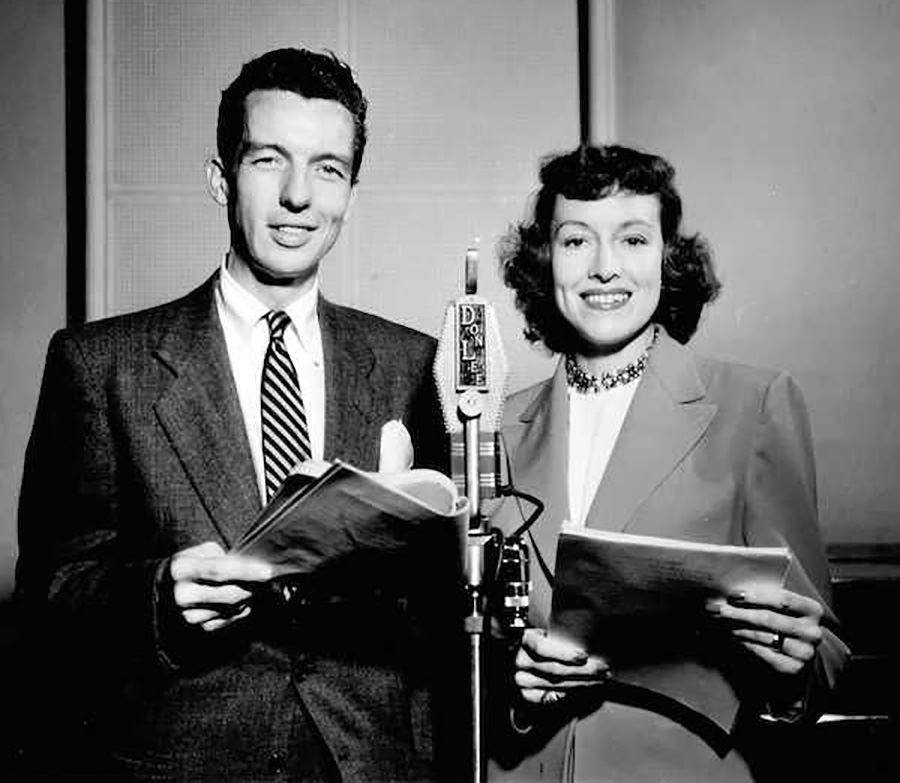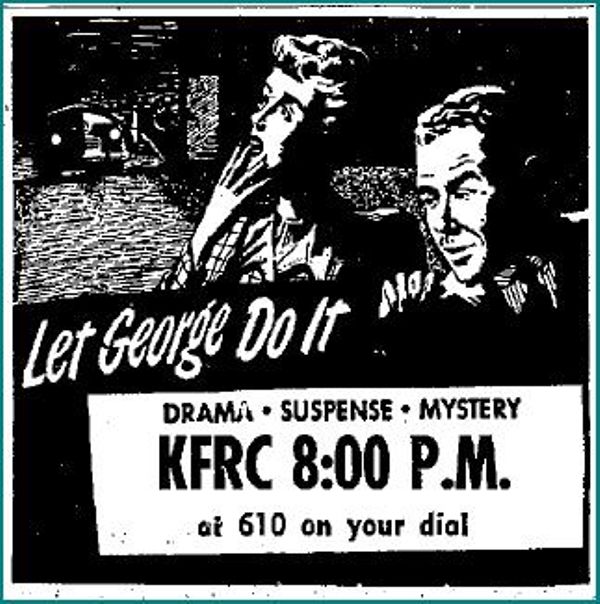“Personal notice: danger’s my stock-in-trade…”
Posted by Ivan G. Shreve, Jr. on Oct 18th 2017
While attempting to make a name for himself as an actor in motion pictures, Bob Bailey did a little freelancing in radio. Though under contract to 20th Century-Fox, he discovered that he enjoyed performing in the aural medium. “If you know how to handle your voice in radio,” Bailey once observed of the craft, “it’s almost impossible to destroy an illusion.” That very skill would help the actor deliver his definitive portrayal of the titular insurance investigator on Yours Truly, Johnny Dollar. However, on this date in 1946, Bob began emoting in a different detective role — one that would become every bit as beloved as “the man with the action-packed expense account” — on a program called Let George Do It.
George Valentine didn’t start out as a private investigator. In the early years of Let George Do It, he was just a guy willing to tackle unpleasant tasks on behalf of his clients. In fact, his motto was: “If the job’s too tough for you to handle, you’ve got a job for me.” (Hence the title of the series—a reference to the old idiom “let George do it.”) Early audition records for the series introduced George as an ex-G.I. who got into the “problem solving” business to address the issue of his rapidly depleting bank account. Let George Do It functioned, at times, as more of a situation comedy than the crime drama it eventually became.
George’s gal Friday, Claire “Brooksie” Brooks, was with him from the get-go. She was “volunteered” to be Valentine’s assistant by her brother Sonny, who was working as George’s office boy. The working relationship between George and Claire was an interesting one — he affectionately called her “Angel,” and she returned the favor with “Darling.” One might say that the two of them enjoyed an innocent Lamont Cranston-Margo Lane-type flirtation. It was a bit one-sided, to be honest; Brooksie was seriously carrying a torch for her boss and was looking forward to a day when she might trade in her nickname for the title “Mrs. George Valentine.” The object of her affection wasn’t quite ready to move into the proverbial little cottage with the white picket fence…and went to great lengths to change the subject whenever Brooksie hinted about “happy ever after.”

“A lady of initiative, courage, and foresight, whose efforts made her his partner, in all but name” is how author Jack French described the Brooksie character in his seminal old-time radio reference Private Eyelashes. Jack identifies actress Lillian Buyeff as the first to play Claire, but fans of the show acknowledge that it was Frances Robinson who made the role her own. Robinson would emote as Brooksie until 1949, when she turned the role over to Shirley Mitchell (who would be followed by Virginia Gregg). Claire’s brother Sonny only appeared in the early episodes of Let George Do It, portrayed by radio veteran Eddie Firestone. The same goes for the character of Caleb, an elevator operator and general jack-of-all-trades, essayed by Joseph Kearns. Wally Maher played Valentine’s contact on the police force, Lieutenant Riley, and while there was a little antagonism between the two men (standard crime drama conflict, you understand) the chemistry in the Bailey-Robinson-Maher years was among radio’s best. When Maher suddenly passed away in 1951, actor Ken Christy joined the show as Lieutenant Johnson. (Johnson was a bit more hard-nosed than Riley, who often called his friend Valentine “chum-boy.”)
Let George Do It stood out from many of the shows broadcast over Mutual in a number of ways. First, it attracted the sponsorship of Standard Oil (now known as Chevron) at a time when much of the network’s programming functioned on a sustaining basis (announcer John Hiestand did the company’s commercials). George also boasted exemplary scripts from a team of scribes that included Polly Hopkins (who developed the character of Brooksie), Herbert Little, Jr., David Victor, and Jackson Gillis (who later enjoyed a long period of employment on TV’s Perry Mason as a writer and associate producer). The performances on the show were also the very picture of professionalism; the crème de la crème of Radio Row worked steadily on George—familiar names like William Conrad, Howard McNear, Hans Conried, Jeanette Nolan, John Dehner, Betty Lou Gerson, Lurene Tuttle, Herb Butterfield, and Harry Bartell.
The list of radio actors above makes it obvious that Let George Do It originated from Hollywood…and this is why it’s been speculated that more people listen to the series today than when it was originally broadcast. George, like The Whistler, was heard by West Coast audiences only — it wouldn’t reach the opposite coast until 1954-1955, when New York radio listeners were introduced to transcriptions of the series. (That same New York syndicator also provided transcriptions to audiences in Canada…minus the Standard Oil commercials, of course.) Listening to surviving episodes of Let George Do It reveals that it was a most underrated program, and it’s no surprise that a new generation of fans rate it highly among crime dramas of its type. Some of that might be due to the presence of Bob Bailey, of course, who had Johnny Dollar waiting for him in the wings (Bailey left George in its last season, and was replaced by Olan Soulé), but however you slice it, George remains a most entertaining listen.

George Valentine made a good living as an investigator…but here at Radio Spirits, we’re in the entertainment business—and we’ve got a brand-new Let George Do It collection, Sweet Poison, ready for your edification with sixteen action-packaged broadcasts from the series. To complement this, why not check out our earlier release Cry Uncle, another fine set containing sixteen episodes (and a liner note booklet written by yours truly) from your friends at Radio Spirits!

